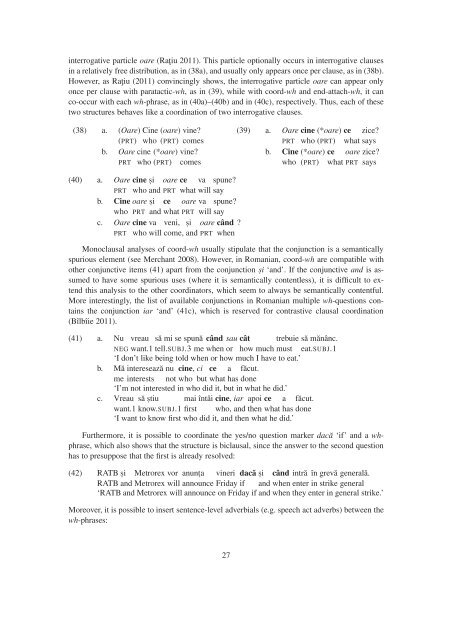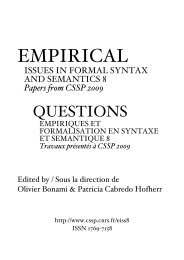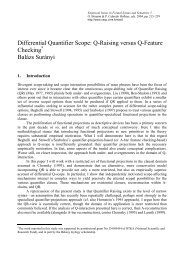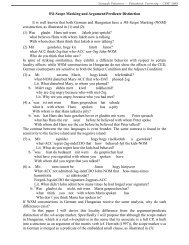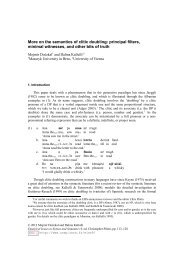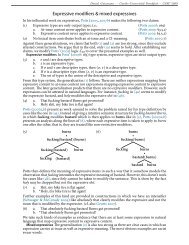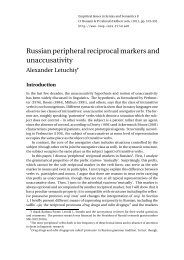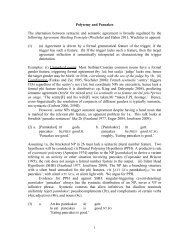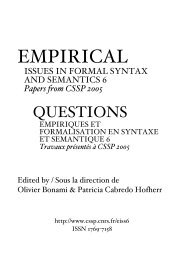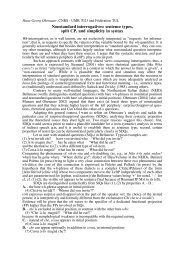Empirical Issues in Syntax and Semantics 9 (EISS 9 ... - CSSP - CNRS
Empirical Issues in Syntax and Semantics 9 (EISS 9 ... - CSSP - CNRS
Empirical Issues in Syntax and Semantics 9 (EISS 9 ... - CSSP - CNRS
You also want an ePaper? Increase the reach of your titles
YUMPU automatically turns print PDFs into web optimized ePapers that Google loves.
<strong>in</strong>terrogative particle oare (Raţiu 2011). This particle optionally occurs <strong>in</strong> <strong>in</strong>terrogative clauses<br />
<strong>in</strong> a relatively free distribution, as <strong>in</strong> (38a), <strong>and</strong> usually only appears once per clause, as <strong>in</strong> (38b).<br />
However, as Raţiu (2011) conv<strong>in</strong>c<strong>in</strong>gly shows, the <strong>in</strong>terrogative particle oare can appear only<br />
once per clause with paratactic-wh, as <strong>in</strong> (39), while with coord-wh <strong>and</strong> end-attach-wh, it can<br />
co-occur with each wh-phrase, as <strong>in</strong> (40a)–(40b) <strong>and</strong> <strong>in</strong> (40c), respectively. Thus, each of these<br />
two structures behaves like a coord<strong>in</strong>ation of two <strong>in</strong>terrogative clauses.<br />
(38) a. (Oare)<br />
(PRT)<br />
b. Oare<br />
PRT<br />
C<strong>in</strong>e<br />
who<br />
c<strong>in</strong>e<br />
who<br />
(oare)<br />
(PRT)<br />
(*oare)<br />
(PRT)<br />
v<strong>in</strong>e?<br />
comes<br />
v<strong>in</strong>e?<br />
comes<br />
(39) a. Oare c<strong>in</strong>e (*oare)<br />
PRT who (PRT)<br />
b. C<strong>in</strong>e<br />
who<br />
(*oare)<br />
(PRT)<br />
ce<br />
what<br />
ce zice?<br />
what says<br />
oare zice?<br />
PRT says<br />
(40) a. Oare c<strong>in</strong>e și oare ce va spune?<br />
PRT who <strong>and</strong> PRT what will say<br />
b. C<strong>in</strong>e oare și ce oare va spune?<br />
who PRT <strong>and</strong> what PRT will say<br />
c. Oare c<strong>in</strong>e va veni, și oare când ?<br />
PRT who will come, <strong>and</strong> PRT when<br />
Monoclausal analyses of coord-wh usually stipulate that the conjunction is a semantically<br />
spurious element (see Merchant 2008). However, <strong>in</strong> Romanian, coord-wh are compatible with<br />
other conjunctive items (41) apart from the conjunction și ‘<strong>and</strong>’. If the conjunctive <strong>and</strong> is assumed<br />
to have some spurious uses (where it is semantically contentless), it is difficult to extend<br />
this analysis to the other coord<strong>in</strong>ators, which seem to always be semantically contentful.<br />
More <strong>in</strong>terest<strong>in</strong>gly, the list of available conjunctions <strong>in</strong> Romanian multiple wh-questions conta<strong>in</strong>s<br />
the conjunction iar ‘<strong>and</strong>’ (41c), which is reserved for contrastive clausal coord<strong>in</strong>ation<br />
(Bîlbîie 2011).<br />
(41) a. Nu vreau să mi se spună când sau cât trebuie să mănânc.<br />
NEG want.1 tell.SUBJ.3 me when or how much must eat.SUBJ.1<br />
‘I don’t like be<strong>in</strong>g told when or how much I have to eat.’<br />
b. Mă <strong>in</strong>teresează nu c<strong>in</strong>e, ci ce a făcut.<br />
me <strong>in</strong>terests not who but what has done<br />
‘I’m not <strong>in</strong>terested <strong>in</strong> who did it, but <strong>in</strong> what he did.’<br />
c. Vreau să știu mai întâi c<strong>in</strong>e, iar apoi ce a făcut.<br />
want.1 know.SUBJ.1 first who, <strong>and</strong> then what has done<br />
‘I want to know first who did it, <strong>and</strong> then what he did.’<br />
Furthermore, it is possible to coord<strong>in</strong>ate the yes/no question marker dacă ‘if’ <strong>and</strong> a whphrase,<br />
which also shows that the structure is biclausal, s<strong>in</strong>ce the answer to the second question<br />
has to presuppose that the first is already resolved:<br />
(42) RATB și Metrorex vor anunța v<strong>in</strong>eri dacă și când <strong>in</strong>tră în grevă generală.<br />
RATB <strong>and</strong> Metrorex will announce Friday if <strong>and</strong> when enter <strong>in</strong> strike general<br />
‘RATB <strong>and</strong> Metrorex will announce on Friday if <strong>and</strong> when they enter <strong>in</strong> general strike.’<br />
Moreover, it is possible to <strong>in</strong>sert sentence-level adverbials (e.g. speech act adverbs) between the<br />
wh-phrases:<br />
27


